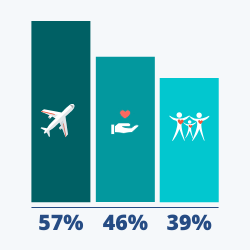Millennials are a force to be reckoned with.
They’re now the largest living adult generation in the U.S., having overtaken Baby Boomers in 2019. More than one-in-three working Americans (35%) are Millennials, which makes them the largest generation in the U.S. labor force.
And while claims that Millennials are set to make up 75% of the workforce by 2025 are disputed (rightly so, as it’s hard to believe that the remaining three generations will account for just 25% of the workforce), Millennials still hold the workplace majority.
Given their sheer dominance, it’s no wonder employers are eager to understand what motivates Millennials in the workplace. It’s the key to attracting and retaining the best talent of those born between 1981 and 1996. Or in other words, those who are currently aged from 24 to 39 1980 and 2000 (as of 2020).
So what do Millennials want from the workplace? And how can employers give it to them?

One thing’s for sure, it takes more than salary packages and perks to win over this influential demographic.
Here are 5 things Millennials want from their work environment:
1. Work and lifestyle balance:
Studies on Millennials in the workplace, such as the Deloitte Global Millennial Survey 2019, show that this age group still want to earn high salaries and be wealthy like their predecessors.
But their priorities have shifted, and workplace culture and experiences are more valuable to them.

Deloitte found that travel and seeing the world was at the top of 57% of Millennials’ list of aspirations. COVID-19 may have put the brakes on their ability to travel — but only temporarily. Furthermore, 46% of Millennials are more attracted to making a positive impact in their communities or society than in having children and starting families (39%).
The report states:
“Generally, millennials think their ambitions are achievable. But for many, their dreams have been delayed by financial or other constraints.”
2. Work flexibility and freedom:
The desire to work flexibly and move away from rigid 9-5 structures shows that the Millennial workforce value workplace freedom and flexibility much more than previous generations.

An earlier study from Deloitte (2016) found that nearly 75% of Millennials in the workplace place importance on a “work from home” or “work remotely” policy.
Now that we’re experiencing the world’s biggest home-working experiment, how does that research hold up?
According to research from Vitality Group, a health and wellness firm, COVID-19 is taking its toll on the world’s largest generation. While working remotely during the health crisis, 1 in 3 Millennials are reporting lower productivity than usual, and around 25% are feeling a decreased employer connectivity.
Therefore it’s important for employers to provide an environment where people feel valued and trusted, and to provide the flexibility and freedom to allow them to do their best work — whenever, and wherever — that may be. We know that when planned and managed correctly, remote work can significantly improve productivity and retention. During the current situation, it’s mission-critical for leaders to provide the support and structure their Millennial workforce needs.
[wd_hustle id=”3″ type=”embedded”/]
3. Opportunity for thrive:
Contrary to some opinions, Millennials work hard.
According to a decade-long study by Jennifer Deal and Alec Levenson, ‘What Millennials Want from Work’, Millennials are committed and would prefer to do well within an organization, rather than leave.
But that doesn’t equate to blind loyalty. At least one third of Millennials are assessing the environment for better options.
To keep the best Millennial talent, organizations should provide the right leadership and support, and focus on developing their skills for the future.
And while Millennials continue to adjust to the current situation, which often means working from home, it’s important to prevent burnout by setting boundaries and reducing work overload, particularly while the line between work and home life is virtually nonexistent.
4. Leadership:
Millennials want leadership and coaching, not authoritarian management.
According to Gallup, Millennials expect their managers to coach their performance and to value them as people and employees. That requires real relationships, not command-and-control management.
In our new world of remote work and virtual meetings, it’s easy for brand culture and team cohesion to fall apart. It’s no longer possible to lean over the desk and check in on a project or ask for advice. It’s vital that employers adapt their management style to lead and develop their team, and put the necessary tools and communication structures in place to allow this to happen.

5. Tools and tech:
Widely known as ‘digital natives’, Millennials grew up with the Internet and saw massive improvements in mobile and wireless technology along the way.
In many cases, the tech that Millennials have at home far exceeds the quality or performance of the tools they use at work, which is a significant obstacle to productivity.
While Millennials typically embrace technology as a means to do their work faster and more efficiently, working remotely can and does throw up connectivity issues.
Therefore it’s important for employers to invest in the right technology for their workforce — this is not necessarily the most hyped new product on the market, but the piece of equipment that best suits your company culture and your team’s requirements.

What Do Millennials Value?
Now we know how Millennials work and what makes them tick, what else do we know about this hard-working age group?
What’s important to Millennials?
One of the major milestones of this generation is the emergence of the ‘sharing economy’.
It reflects this demographic’s reluctance to buy items when instead, they can share or subscribe to them.
It impacts everything from homes and music to workspace.
This reduces the cost of acquiring and maintaining major goods, and often generates positive side effects; for instance, renting or sharing a home enables greater flexibility and the option to move quickly, should new career opportunities come up.
Another example is shared workspace. Millennials who share workspace, often by subscribing to a coworking membership, have the benefit of expanding their professional networks and business opportunities simply by tapping their coworkers’ knowledge.
The concept of sharing has of course taken a hit during the pandemic.
Millennials will be feeling this impact perhaps more than any other generation, as they have come to embrace the sharing economy and integrate it into their everyday lives. Sharing models have adapted as a result.
Shared workspaces, for instance, have reduced capacity in their spaces, set up one-way systems, and made pre-booking of some spaces — such as meeting rooms or hot desks — mandatory. This allows for additional cleaning and sanitizing between occupiers.

Training and ‘Upskilling’
Millennials value the opportunity to train and gain new skills.
Limited availability of skills is a serious problem for companies, both now and for the future of work.
A report by the World Economic Forum highlights the need to continually upskill the workforce as new technologies influence and change the way we work:
“The accelerating pace of technological, demographic and socio-economic disruption is transforming industries and business models, changing the skills that employers need and shortening the shelf-life of employees’ existing skill sets in the process.”
That’s why employers must continually invest in relevant training.
Indeed, upskilling and ‘learnability’ is an essential component of the future of work; it is an important piece of the workplace puzzle not just for Millennial employment, but also for the ongoing growth, and succession, of the companies that employ them.
But when it comes to the Millennial work environment, it’s not just about having the skills to do their work…
They also want purpose.
Purpose and Accountability
Many millennials consider themselves purpose-driven, and want to work for a company whose values reflect their own.
Interestingly, the pandemic appears to have reinforced their desire to help drive positive change in their communities. Around three-quarters of respondents to Deloitte’s Global Millennial Survey 2020 found that the pandemic has highlighted new issues and made them even more sympathetic toward the needs of others in their local communities and around the world.
The majority have also, or plan to, take positive actions to improve their own lives and the lives of others in their communities.
How Can We Create a Millennial-Friendly Workplace While Working Remotely?
A big concern for younger generations right now is working in isolation.
Not only does this lead to loneliness, stress and burnout, it also prevents younger workers from gaining access to the networks and knowledge they would naturally pick up in a workplace environment.
Innovation, creativity, and opportunities often come from chance encounters; the same goes for transfer of knowledge. So how do you replicate that in a remote environment?
A certain amount can be done with the help of digital channels such as video calls and instant messaging. But we still need in-person communication.
That’s where a flexible workplace strategy can help.
Some companies are now using ‘hub and spoke’ workspace models, using a centralized office as a collaboration zone and using multiple ‘spoke’ locations, which may be virtual offices or coworking spaces, to enable people to meet or work close to home.
In a virtual office, physical workplace components such as workstations, meeting rooms, and printing facilities are available to use on-demand. This increases flexibility and enables workers to access the space and amenities they need, whenever they need it.
Therefore workers are free to carry out the majority of their duties remotely, wherever they feel most productive, while benefiting from a centralized support system.
Final Thoughts
Millennials don’t intend to keep a job for life like their predecessors.
They want to feel happy and valued in their role, and those who don’t will simply vote with their feet.
This isn’t a challenge for the next generation to solve.
It’s happening now, and if neglected, it will grow into a much larger problem.
That’s why it’s important to closely understand what Millennials need and ensure the workplace is adapted to meet those requirements.
That goes for practical requirements, like high-speed WiFi and connectivity, and emotional needs — such as having a shared purpose, feeling engaged, and fulfilling work/life balance by having the opportunity to work flexibly.

